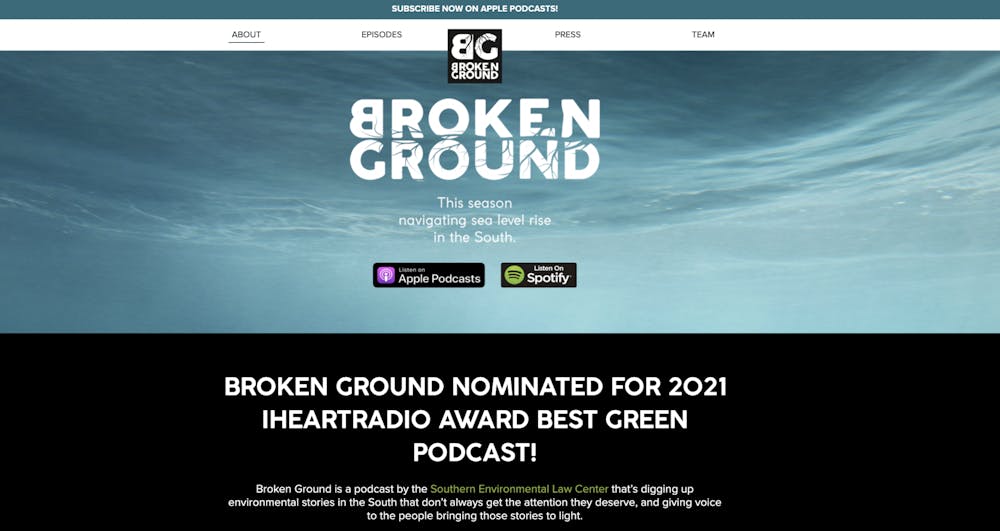“Broken Ground,” a podcast that discusses environmental stories in the southern United States, has recently come out with a new season that focuses on citizens — specifically in Norfolk and Charleston, S.C. — dealing with sea level rise and all the flooding that comes with it. The podcast is produced in the Charlottesville office of the Southern Environmental Law Center.
Today, the media is often saturated with the term “climate change,” and while these effects may seem distant, when it comes to rising sea levels, many people feel the effects daily. These effects are especially noticeable with events like sunny day flooding, otherwise known as nuisance flooding, which happens when flooding occurs without a big rainstorm or an obvious culprit. According to University Environmental Science Prof. Karen McGlathery, this categorization of flooding, which happens about once a month in Norfolk, can occur solely due to full moons and very high tides.
“Because we have a higher sea level than we have had in the past, [communities] get regular flooding that occurs even without a big storm pushing a lot of water, and the rate of sea level rise in Virginia is about three times the global average of sea level rise,” McGlathery said.
SELC Senior Attorney Morgan Butler explains the concept of marsh migration, which is a natural flooding preventative where marshes move to maintain their ideal environments.
“Marshes have the natural ability to migrate [and] move back to higher ground as the seas gradually rise,” Butler said.
As seen by the process of this migration, nature naturally works to repair itself. However, marshes are increasingly being surrounded by manmade infrastructure like buildings and parking lots. McGlathery notes that when this human infrastructure obstructs the process of marsh migration, the marsh will have nowhere to go and will be unable to follow its natural course.
“If marshes can’t increase their elevation and move inland as seas rise — it’s like the tide rising on the beach — then [the marshes] drown,” McGlathery said.
To put a halt to regular flooding, McGlathery says the first and most important thing to do is to address climate change, which is causing the sea levels to rise. She notes that it will take many decades — maybe even 100 years — to begin to see any kind of impact from efforts society makes to address climate change.
In the meantime, many things can be done that will yield a range of benefits. Essentially, this involves reducing carbon dioxide emissions and protecting communities most vulnerable to rising sea levels.
“[Knowing] what people and what structures are most vulnerable to coastal flooding [will allow people to map vulnerabilities],” McGlathery said.
Many scientists and activists are advocating for the use of nature-based solutions, which McGlathery says involve the use of natural habitats like salt marshes to absorb some of the flooding. Other mechanisms involve using green infrastructure — which involves taking elements of nature, putting them in the Earth and using them to help redirect the flow of water. This could mean the use of wetlands or green culverts to serve — a small channel, like a tunnel, that lets water flow under a road, railroad or other infrastructure — as a place for the flooding water to go.
Additionally, addressing all aspects of the climate puzzle creates many co-benefits.
“Switching over to clean energy [would create] a huge number of jobs,” Butler said.
Out of all three seasons of “Broken Ground” that host Claudine Ebeid McElwain has been involved with, she notes that this season has shed more light on environmental justice and equity issues.
“For that, I think it's a really important season,” McElwain said. “Focusing on what's happening … here in our region in the south … where these communities are the ones that are at the forefront of dealing with the fallout of climate change is really important.”
Paraphrasing a quote from Dr. Robert Bullard — the father of environmental justice — McElwain notes that people who have been most negatively impacted by COVID-19 have been experiencing the tumult rushing out with the floods.
“The people who have the least are going to be hurt the first, worst and longest,’’ McElwain said.
This is because climate issues tend to impact people who do not have the resources to combat it. For example, if one’s neighborhood constantly floods, it’d seem like a good option to move — however, not everyone has the financial capital and ability to do so, leaving them to continue to suffer from the issue.
“Broken Ground” is attempting to raise awareness for the issue of rising sea levels that is continuing to augment and impact the daily lives for those living only hours away from Charlottesville.







